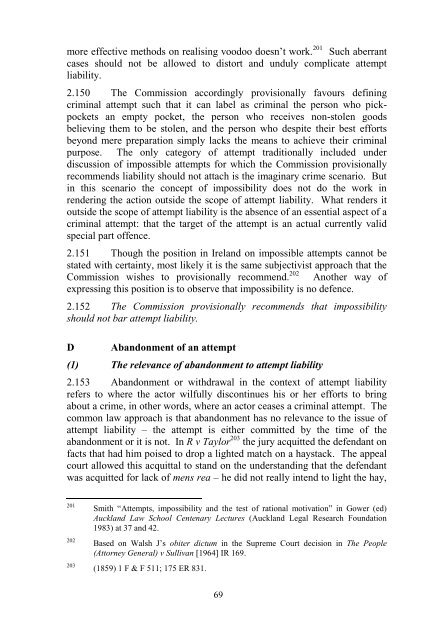Consultation Paper on Inchoate Offences - Law Reform Commission
Consultation Paper on Inchoate Offences - Law Reform Commission
Consultation Paper on Inchoate Offences - Law Reform Commission
Create successful ePaper yourself
Turn your PDF publications into a flip-book with our unique Google optimized e-Paper software.
more effective methods <strong>on</strong> realising voodoo doesn‟t work. 201 Such aberrantcases should not be allowed to distort and unduly complicate attemptliability.2.150 The Commissi<strong>on</strong> accordingly provisi<strong>on</strong>ally favours definingcriminal attempt such that it can label as criminal the pers<strong>on</strong> who pickpocketsan empty pocket, the pers<strong>on</strong> who receives n<strong>on</strong>-stolen goodsbelieving them to be stolen, and the pers<strong>on</strong> who despite their best effortsbey<strong>on</strong>d mere preparati<strong>on</strong> simply lacks the means to achieve their criminalpurpose. The <strong>on</strong>ly category of attempt traditi<strong>on</strong>ally included underdiscussi<strong>on</strong> of impossible attempts for which the Commissi<strong>on</strong> provisi<strong>on</strong>allyrecommends liability should not attach is the imaginary crime scenario. Butin this scenario the c<strong>on</strong>cept of impossibility does not do the work inrendering the acti<strong>on</strong> outside the scope of attempt liability. What renders itoutside the scope of attempt liability is the absence of an essential aspect of acriminal attempt: that the target of the attempt is an actual currently validspecial part offence.2.151 Though the positi<strong>on</strong> in Ireland <strong>on</strong> impossible attempts cannot bestated with certainty, most likely it is the same subjectivist approach that theCommissi<strong>on</strong> wishes to provisi<strong>on</strong>ally recommend. 202 Another way ofexpressing this positi<strong>on</strong> is to observe that impossibility is no defence.2.152 The Commissi<strong>on</strong> provisi<strong>on</strong>ally recommends that impossibilityshould not bar attempt liability.DAband<strong>on</strong>ment of an attempt(1) The relevance of aband<strong>on</strong>ment to attempt liability2.153 Aband<strong>on</strong>ment or withdrawal in the c<strong>on</strong>text of attempt liabilityrefers to where the actor wilfully disc<strong>on</strong>tinues his or her efforts to bringabout a crime, in other words, where an actor ceases a criminal attempt. Thecomm<strong>on</strong> law approach is that aband<strong>on</strong>ment has no relevance to the issue ofattempt liability – the attempt is either committed by the time of theaband<strong>on</strong>ment or it is not. In R v Taylor 203 the jury acquitted the defendant <strong>on</strong>facts that had him poised to drop a lighted match <strong>on</strong> a haystack. The appealcourt allowed this acquittal to stand <strong>on</strong> the understanding that the defendantwas acquitted for lack of mens rea – he did not really intend to light the hay,201202203Smith “Attempts, impossibility and the test of rati<strong>on</strong>al motivati<strong>on</strong>” in Gower (ed)Auckland <strong>Law</strong> School Centenary Lectures (Auckland Legal Research Foundati<strong>on</strong>1983) at 37 and 42.Based <strong>on</strong> Walsh J‟s obiter dictum in the Supreme Court decisi<strong>on</strong> in The People(Attorney General) v Sullivan [1964] IR 169.(1859) 1 F & F 511; 175 ER 831.69
















